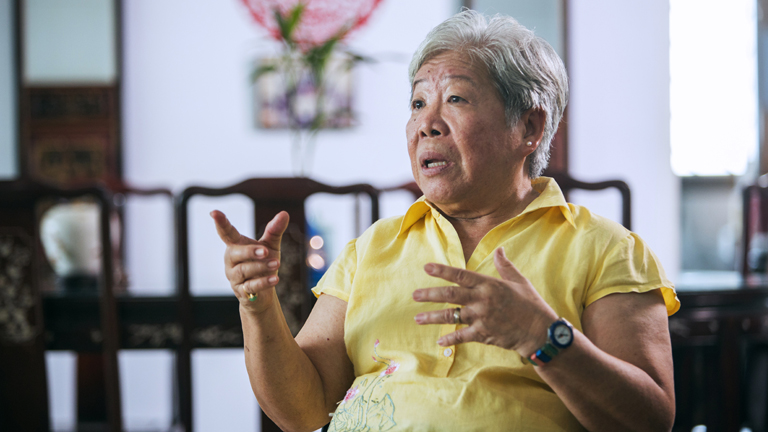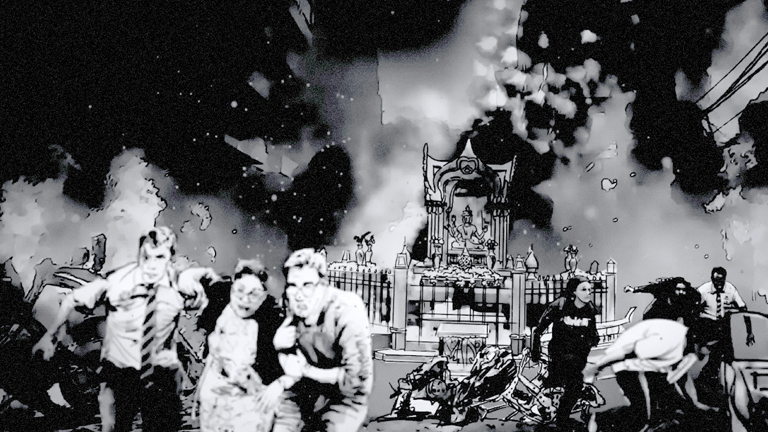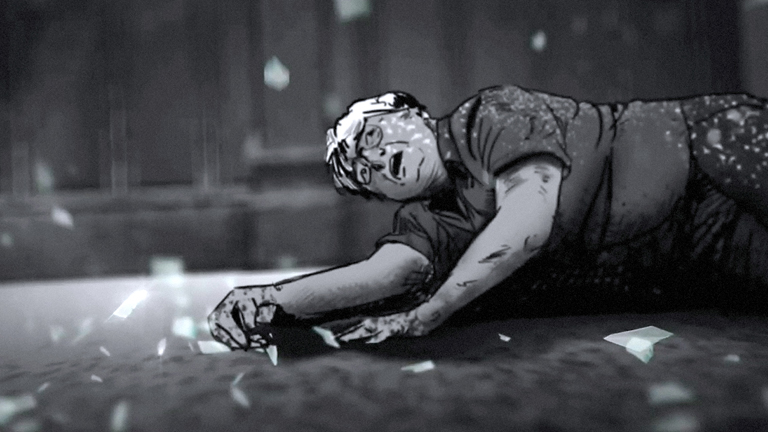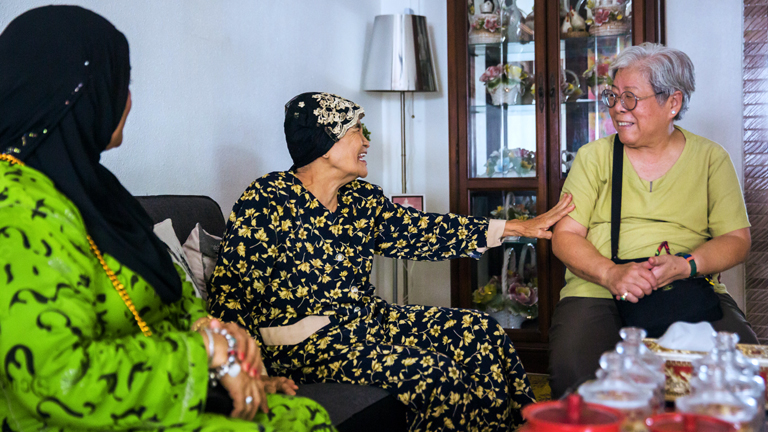A Close Shave With Death
The horrors of terrorism hit without warning, reaching beyond geography and nationality. Few Singaporeans understand this as personally as Erawan Shrine bombing survivor Betty Ong. She recounts her brush with terror.
t was a day of celebration atSri Lanka’s St Anthony’s Shrine.
The congregation began their Easter morning mass in Colombo, praying and singing hymns. But just minutes later, an explosion ripped through the church, so intense that it blew through its roof. Splinters and glass shards rained on the chapel floor. Shortly after this first bomb, a series of blasts struck churches and hotels in and around the capital city. In total, eight blasts tore through Sri Lanka that morning, wreaking mayhem.
The horrorof the attacks stirred memories in Betty Ong, thousands of miles away in Singapore. She had learnt about the horrors of the Sri Lanka bomb blasts through news reports. “I was thinking, how could these people do such a thing?” Betty recounts. “My thoughts were with those who lost their loved ones. How could they go on?”
Nearly all the victims of the Easter Sunday attacks were Sri Lankans, but there were also reports of foreigners amongst the victims — Japanese, Americans, Indians, British, Chinese Australians and Dutch. In total, some 253 people were killed and 500 wounded*.
“Nobody thought that it could happen to them,” relates Betty. “It instantly brought me back to my own experience.”
In 2015, Betty had her own close shave with death in Thailand.As a tourist mecca, Thailand attracts millions of visitors from Asia and beyond every year. Betty’s own experience with terror happened years before the Colombo blasts, but the day’s events are still fresh in her mind.
It was a typical family vacation. Betty, her sister, her brother and his wife hadjust ended their trip to the Khao Yai National Park in August, but before flying back, the group decided to stop at Bangkok’s famous Erawan Shrine to pray for their safety and protection.
Betty and her family arrived at the small compound at the busy downtown Ratchaprasong intersection, just as dusk began to fall. Throngs of tourists and devotees were packed into the shrine, holding joss sticks and flowers and praying to the shimmering gold, four-faced Hindu god, Brahma. Betty lit her joss stick and started walking to the first prayer station. She uttered a silent prayer of forgiveness for not being able to kneel because of her bad knee. Just as she was moving to the second prayer station, a deafening blast ripped through the shrine.
“I turned my head and saw a flash of bright light. It was very loud, I couldn’t stand, I was thrown off and in shock,” recalls Betty. “On my right was my brother, and beside him, there were about a dozen bodies.”
The minutes after were a blur to Betty. She was conscious, but could barely process the horror of the situation. She saw people running around aimlessly, their faces ashen from the layer of dust, their skin pale with fear. She saw screaming faces. Flailing arms. Weeping eyes. But she heard only silence.
"I was totally deaf. I just sat on the ground,” recalls Betty. "The next thing I knew, shards of glass were falling like rain."
The explosion was so intense that it shattered the windows of the nearby Hyatt Hotel, bringing about the downpour of glass. The Erawan Shrine, said to be built to counter bad karma from a hotel construction, was now the scene of unspeakable terror.
Through the fog of her shock, Betty saw a mother who was searching and calling out for her child. Next to her, she saw a boy lying motionless on the ground. Betty’s heart sank. “These are things that will always stay with you,” she remembers.
The blast at the Erawan Shrine on 17 August 2015 was the deadliest terror attack in modern Thai history. It killed 20 people, including one Singaporean, and injured more than 120 others. Its victims included those from as far as Austria and Oman. It was pure luck that Betty was alive.
Betty’s family miraculously all survived. Her sister-in-law was unharmed, but the rest of the family was injured. Her brother had pellets from the blast lodged in his body and could not walk, and her sister’s leg was bleeding from shrapnel that wounded her. A kind stranger brought over a push cart and helped her brother into it. They moved out of the blast zone and were evacuated to a nearby hospital. “Everybody was sitting there (at the hospital) and waiting. There was blood and those who were bleeding were treated first,” Betty recalls.
Doctors found two pellets lodged in Betty’s brother, one in his leg which broke his shin, and another in his large intestine. For eight hours, doctors operated on him. He survived. Her sister had shrapnel removed from her leg and face, while Betty herself escaped with minor cuts and seven stitches. “My ear drum burst because the blast was too loud, but fortunately it has healed,” she recalls.
Betty and her family stayed on in the Bangkok hospital to recover, and she remembers being treated very well by the medical staff, psychologists and trauma specialists who frequently visited them. The four of them were discharged and flew back to Singapore after two weeks, where they had medical follow-ups at the Singapore General Hospital. “We four are still together now, I feel very blessed and lucky,” says Betty.
Thai authorities discovered that a backpack packed with explosives left under a bench near the shrine had caused the explosion. They arrested two suspects but investigations have still not been conclusive. Despite her experience, Betty does not hold a grudge against the perpetrators.
"We survived the bomb blast, we are blessed, we shouldn’t be angry about anything," Betty says. "There’s no anger in me now."
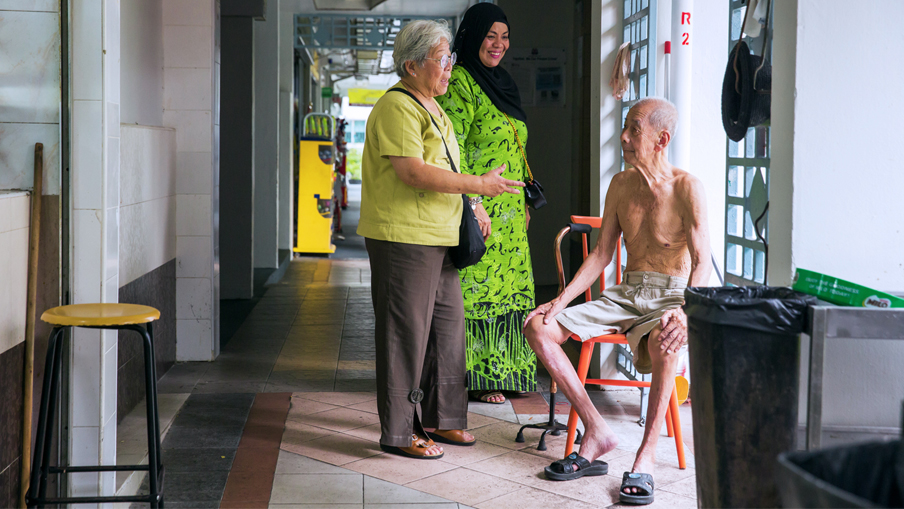 After her close brush with death, Betty has become more involved in
community work, including befriending underprivileged neighbours.
After her close brush with death, Betty has become more involved in
community work, including befriending underprivileged neighbours.
Now four years since the incident, Betty and her siblings each deal with their experience in their own way. While she has spoken openly to the media about the trauma they went through, her brother and sister to this day avoid speaking about it, even to each other. “For my siblings, they don’t want to have any memory of this. To them, they just feel lucky to have survived,” says Betty.
Her narrow escape from death has altered Betty’s experience of the world, including making her a lot more aware of her surroundings. She recalls once seeing a large abandoned haversack in a shopping centre and immediately reporting it to security officers. They eventually found that it was a bag of tools that someone had left behind.
"When I go out now, I’m suspicious when anybody carries a haversack that looks heavy," she says. "In Singapore, we are more complacent, because we are all well taken care of. We need to be more alert."
Betty believes this mindset needs to be more deeply ingrained in Singaporeans. She actively supports initiatives to heighten vigilance, like SGSecure, a national movement launched by Prime Minister Lee Hsien Loong in September 2016 to increase preparedness among the public should a terror attack occur.
This is one of the reasons why Betty shares her experience with whoever asks, including people she bumps into at the market and shops who may recognise her. “Now I’m no longer ‘bo-chap’; I’ve become more ‘kaypoh’,” she laughs. “We have to be more vigilant now, that’s a better word.”
She is also spurred on to do more to help others, including being a befriender to underprivileged neighbours in her home at Bukit Batok. “I do more community work because I feel that it’s good to be alive,” says Betty.
Saddened by news of the Sri Lanka blasts, and the Christchurch mosque shootings just a month before that, Betty prays Singapore will never face a terror attack. She believes the only way this is possible is if people never let their guard down. “Be careful, don’t say it will not happen,” stresses Betty. “It happened to me and I didn’t expect that.”
*According to figures provided by the Sri Lanka government on 25 April 2019.TERRORISM THREATS REAL IN SOUTHEAST ASIA AND SINGAPORE
A series of high profile terror attacks close to home in the first months of 2019 — in New Zealand and Sri Lanka — would have reminded Singaporeans that the threat of terror remains real. In fact, the Singapore Terrorism Threat Assessment Report 2019 released in January this year found that the regional threat situation remained of significant concern, with the most pressing threat to Singapore posed bythe terrorist group ISIS.
Below is a quick look at ISIS-linked threats in Singapore and the region in recent years*.
* Information adapted from the Singapore Terrorism Threat Assessment Report 2019









